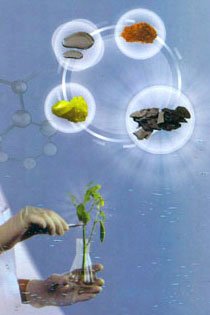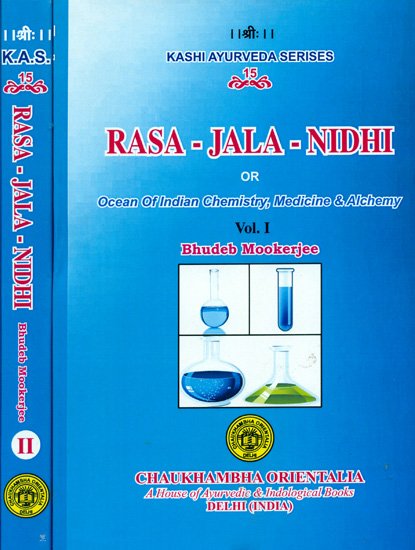Rasa Jala Nidhi, vol 4: Iatrochemistry
by Bhudeb Mookerjee | 1938 | 52,258 words | ISBN-10: 8170305829 | ISBN-13: 9788170305828
This fourth volume of the Rasa-jala-nidhi deals with Rasa-chikitsa-vidya, also known a the science of Iatrchemistry (chemical medicine), a major branch of Ayurveda. It contains Ayurvedic treatments for Fever and Diarrhea. The Rasa-jala-nidhi (“the ocean of Iatrochemistry, or, chemical medicine) is a compendium of Sanskrit verses dealing with ancie...
Part 6 - Directions to be followed in nava-jvara
Living in a place not exposed to drafts of air,
One suffering from fever should live in a place not exposed to drafts of air. Living in such places increases longevity and restores health. A patient suffering from fever should always keep his body covered with thick, warm, and dry clothing, and to satisfy thirst, drink water treated in a way mentioned below.
Directions for taking medicine.
Take mineral medicine immediately after attack of fever without wasting time over the consideration of the doshas and malas or dirts such as urine, stool, etc.) of the body. If proper medicine is duly taken immediately after the commencement of fever, remission generally takes place very soon, and sometimes on the very first day. This remark holds equally good in cases of fevers' due to an excess of the three doshas (such as virulent types of typhoid).
Prohibitions to be observed in primary fever.
The following are forbidden in nava-jvara:—two meals a day, meal in the morning within four hours after sunrise, food tending to produce phlegm, meal at night, food not easily digestible, bathing, anointing the body with oil, turmeric, sandal, etc., taking snehas (i.e oil, clarified butter, fat and marrow), or douches, vomiting, purging by purgatives, taking snuff, sleep at daytime, sexual intercourse, physical exercise, drinking cold water, taking pulses fish, meat, milk, food mixed with curd, clarified butter, and butter milk, labour, exposure to the sun and fire, anger, study, excessive talking, taking sour, bitter, and astringent substances, and exposure to drafts of air.
These prohibitions do not apply in cases where some of the diets prohibited above may be prescribed to a patient attacked with nava-jvara; as for instance, milk should be prescribed to a patient who takes a special class of medicine called “parpati”.
Conclusion:
 This concludes ‘Directions to be followed in nava-jvara’ included in Bhudeb Mookerjee Rasa Jala Nidhi, vol 4: Initiation, Mercury and Laboratory. The text includes treatments, recipes and remedies and is categorised as Rasa Shastra: an important branch of Ayurveda that specialises in medicinal/ herbal chemistry, alchemy and mineralogy, for the purpose of prolonging and preserving life.
This concludes ‘Directions to be followed in nava-jvara’ included in Bhudeb Mookerjee Rasa Jala Nidhi, vol 4: Initiation, Mercury and Laboratory. The text includes treatments, recipes and remedies and is categorised as Rasa Shastra: an important branch of Ayurveda that specialises in medicinal/ herbal chemistry, alchemy and mineralogy, for the purpose of prolonging and preserving life.
